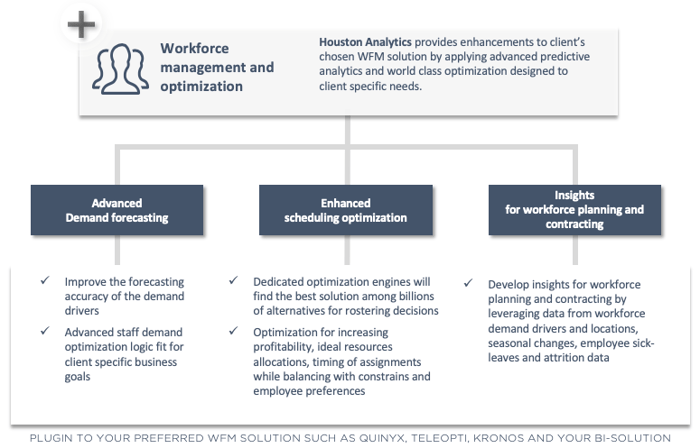Don't change your WFM solution. Enhance it.

Watch WFM optimization beyond AI webinar

Houston’s managed services for WFM will enhance the capabilities of your selected WFM solution in three critical areas: Improve the forecasting accuracy of demand drivers and optimize their conversion into staffing needs, enhance the scheduling optimization logic with client specific optimization engines and generate insights for optimal labor plans and contract structures to best fit forecasted needs, seasonality changes and scheduling needs
Yes. Houston Analytics' Forecasting service applies machine learning and combines time series data with additional variables to generate purpose-built, ready-to-use forecasts for process optimization and decision support.
With machine learning, the forecast models are trained to find unique contextual patterns using your own historical data, and over time the model learns, adapts and improves. Houston Analytics is able to complement your own data sources with external weather, competition, geographical and demographics data available from various public and 3rd party data sources.
This allows you to optimize product and service availability across different categories and locations, decrease over/understocking, and gain an improved understanding of sales patterns and their drivers at a more detailed level.
No. Houston Analytics' forecasting service is fully managed, meaning you don't need to buy any separate analytics solutions or add more resources to your payroll. Houston's experts will take care of the heavy lifting of data modeling, with optimization engines and state-of-the-art machine learning running in the background.
Forecast outputs are integrated into clients' preferred end-user systems and BI tools for simple-to-use consumption.
Most WFM solutions will provide you some baseline forecasts. These generic forecasts are typically based on historical series of data with the assumption that the future can be determined by the past. These generic forecasts may struggle identifying irregularities, special events, changes in the competitive landscape, etc.
Houston’s forecasts combine the historical time series data with additional variables, such as calendar data, marketing campaigns, weather forecasts, visitor counters and other data sets that may be relevant for your business. With advanced machine learning models, we’ll be able to generate hyperlocal forecasting processes capable of identifying complex relationships within the data.
First, we need to have in place the relevant forecasts of various demand drivers impacting the workforce. In the retail and customer service context, for instance, we’ll want to forecasts the number of visitors and gain an understanding of what type of demand it generates. Similar visitor volumes may generate significantly varying demand for customer service personnel depending on the seasonality and time of the day. Respectively, typically after special events, there’s a spike in product returns which will put a strain in service personnel handling such returns – these demand drivers must be taken into account separately.
Although the conversion of certain demand drivers may be rather straightforward – some may require a bit of advanced modeling to define the optimal levels. In the case for sales-oriented customer service personnel for instance, the optimization logic should aim for maximizing overall profitability rather than simply seeking to minimize workforce costs. This can be done by modeling the impact of customer service personnel’s capabilities to convert sales potential into actual sales and with this information we can define the optimal staffing level that is most likely going to maximize overall profitability.
Workforce sizing and scheduling follow are so-called combinatorial problems – where we need to forecast various demand drivers, create shifts and pair individual employees to them. It’s a process that combines several interdependent decisions that must be made and requires obeying a set of rules/constraints to find a feasible solution.
We do not take the term optimization lightly. If the method can't prove a solution is optimal, then it is not the optimization in the mathematical sense. This is a key point in the approach we take at Houston Analytics. Most off-the-shelf software is built by coming up with answers for these points that would suit the widest types of clients possible. We reverse this logic, by relying on our technical capabilities to devise tailor-made models for a client-specific needs using dedicated optimization engines.
©2014-2024 Houston Analytics. All rights reserved.